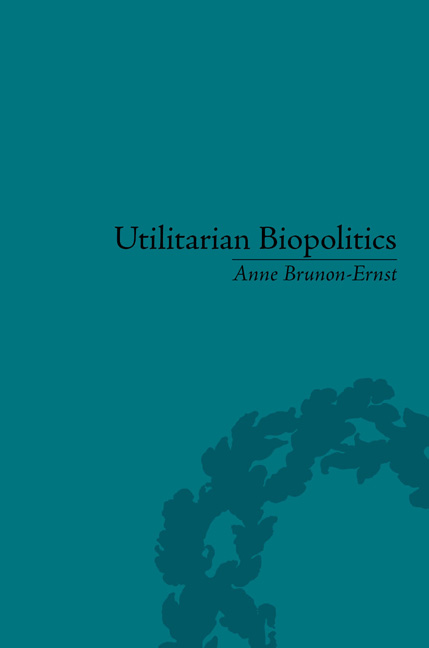Book contents
- Frontmatter
- CONTENTS
- Acknowledgements
- General Introduction
- Part I Biopolitics of Interests Introduction: From Interest to Norms
- Part II Utilitarian Conduct of Conduct Introduction: Legal Norms, Extra-Legal Norms and Utilitarian Conduct
- Part III The Biopolitical Expert Introduction: The Moralist and the Economist
- Epilogue: (De)Constructing Biopolitics
- Notes
- Works Cited
- Index
General Introduction
- Frontmatter
- CONTENTS
- Acknowledgements
- General Introduction
- Part I Biopolitics of Interests Introduction: From Interest to Norms
- Part II Utilitarian Conduct of Conduct Introduction: Legal Norms, Extra-Legal Norms and Utilitarian Conduct
- Part III The Biopolitical Expert Introduction: The Moralist and the Economist
- Epilogue: (De)Constructing Biopolitics
- Notes
- Works Cited
- Index
Summary
Government, here, refers to all endeavours to shape, guide, direct the conduct of others, whether these be the crew of a ship, the members of a household, the employees of a boss, the children of a family or the inhabitants of a territory. And it also embraces the ways in which one might be urged and educated to bridle one's own passions, to control one's own instincts, to govern oneself. Foucault thus implied that, rather than framing investigations in terms of state or politics, it might be more productive to investigate the formation and transformation of theories, proposals, strategies and technologies for ‘the conduct of conduct’.
Utilitarian Biopolitics is the study of the relationship between Jeremy Bentham, the eighteenth-century utilitarian philosopher, and Michel Foucault, his most prominent twentieth-century critic. It offers a new perspective on Foucault's biopolitics, drawing on material from the latest edition of Bentham's Collected Works, from yet unpublished Bentham manuscripts, and from Foucault's recently published lectures at the Collège de France. This book's title – Utilitarian Biopolitics – emphasizes the means by which Foucault's thought employed a framework of ideas and concepts drawn from Bentham's writings. Simultaneously, the book also uses Foucaultian concepts to analyse Bentham's theory on power. In doing so, it tests the validity of Foucaultian concepts and fleshes out new biopolitical concepts (biopolitical pleasure, biopolitical pain and biopolitical language) at the intersection of Bentham and Foucault's theoretical models, and stresses the utilitarian origins, construction and operation of biopolitics.
- Type
- Chapter
- Information
- Utilitarian BiopoliticsBentham, Foucault and Modern Power, pp. 1 - 6Publisher: Pickering & ChattoFirst published in: 2014

